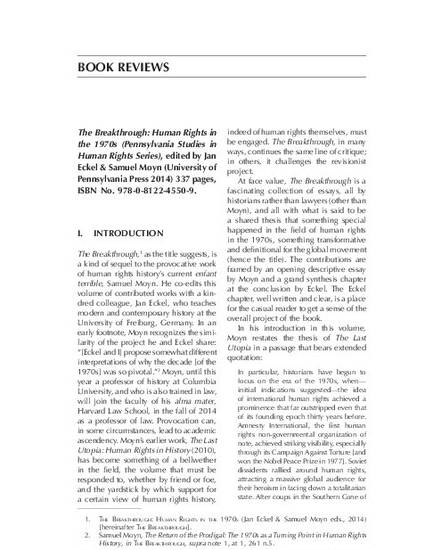
Article
The Breakthrough: Human Rights in the 1970s (Book Review)
Human Rights Quarterly
(2014)
Abstract
The Breakthrough, as the title suggests, is a kind of sequel to the provocative work of human rights history’s current enfant terrible, Samuel Moyn. He co-edits this volume of contributed works with a kindred colleague, Jan Eckel, who teaches modern and contemporary history at the University of Freiburg, Germany. In an early footnote, Moyn recognizes the similarity of the project he and Eckel share: “[Eckel and I] propose somewhat different interpretations of why the decade [of the 1970s] was so pivotal.” Moyn, until this year a professor of history at Columbia University, and who is also trained in law, joined the faculty of his alma mater, Harvard Law School, in the fall of 2014 as a professor of law. Moyn’s earlier work, The Last Utopia: Human Rights in History (2010), has become something of a bellwether in the field, the volume that must be responded to, whether by friend or foe, and the yardstick by which support for a certain view of human rights history, indeed of human rights themselves, must be engaged. The Breakthrough, in many ways, continues the same line of critique; in others, it challenges the revisionist project.
Keywords
- Human Rights,
- Legal History,
- Book Review
Disciplines
- Law and
- Human Rights Law
Publication Date
2014
Citation Information
Richard J. Wilson. "The Breakthrough: Human Rights in the 1970s (Book Review)" Human Rights Quarterly Vol. 36 (2014) p. 915 Available at: http://works.bepress.com/richard_wilson/46/
